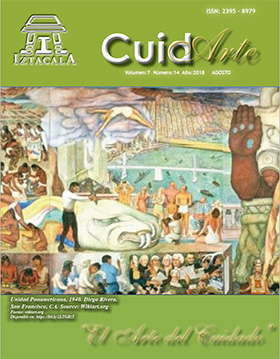An Unloading of Emotions: Living with Epilepsy
Main Article Content
Abstract
Introduction. Epilepsy is the second most common neurological illness in Mexico. According to the World Health Organization, it is a chronic recurrent condition characterized by synchronic and sporadic hyperactivity in the brain cells, which show electric discharges. Stigmatizing this illness can cause biological, psychological, or social repercussions on subjects and their families. Objective. To explain how epilepsy is experienced by patients enrolled in the “Accepting Epilepsy” group of the November 20 Hospital of the Mexican Institute for Social Security and Services for State Workers (ISSSTE). Methodology. Qualitative, phenomenological, and interpretive study. Data were obtained via a group interview of eight patients belonging to the “Accepting Epilepsy” group. Subjects were representative of the total population, had lived with epilepsy for at least three years, and were undergoing treatment for the illness. Findings. Subjects demonstrated both positive and negative feelings and emotions as well as difficulties in interpersonal relations, both within society and within the family. These difficulties hinder the subjects’ ability to live well. Conclusions. Epilepsy damages the self-esteem, independence, and interpersonal relations of those who suffer from it. This can lead to an over-protection of patients by their families, which prevents them from living their lives as they would like to.
Downloads
Download data is not yet available.
Article Details
How to Cite
Vázquez Mata, C. V., Ruíz López, S. V., Carapia Fierros, P., Cruz Vera, J. J., & Guillén Cadena, D. M. (2018). An Unloading of Emotions: Living with Epilepsy. CuidArte Journal, 7(14), 30–41. https://doi.org/10.22201/fesi.23958979e.2018.7.14.69141
Citas en Dimensions Service
References
(1) Organización Mundial de la Salud. Epidemiología de la epilepsia 2004. [Internet]. [Consultado 29 junio 2017]. Disponible en: https://bit.ly/2Na0scE
(2) Figueroa D. Estudios Clínicos Epidemiológicos y psicosociales de la epilepsia. Arch. Neurocien. [Internet] 2010 [Consultado 15 julio 2017]; 15 (3): 139-151. Disponible en: https://bit.ly/2KtPqAF
(3) Rojas G, Pérez A, Pérez M. Percepción sobre sí mismos en las personas con epilepsia. Gac. Med. Espirit. [Internet] 2008 [Consultado 13 Julio 2017];11(2).75-82. Disponible en: https://bit.ly/2Iz3FiL
(4) Ivanovic Z. Evaluación psicosocial de la epilepsia en el nivel primario de atención de salud. Rev. Chil. Neuro-psiquiatr. [Internet] 2016 [Consultado 15 julio 2017]; 44 (3): 187 – 194. Disponible en: https://bit.ly/2MyYNMV
(5) Rojas G, Lorenzo H, Pérez A, Pérez M. Expresiones de la frustración en pacientes con epilepsia. Gac. Med. Espirit. [Internet] 2010 [Consultado 20 julio 2017]; 12(1):1-9. Disponible en: https://bit.ly/2yZEPsS
(6) Mellado O. Efecto de la información sobre la enfermedad en la calidad de vida en los pacientes con epilepsia. An. Med. [Internet] 2016 [Consultado 13 julio 2017]; 61 (2):105-111. Disponible en: https://bit.ly/2yS1Duh
(7) Salgado A. Investigación Cualitativa: Diseño evaluación del rigor metodológico y retos. Liberabit. [Internet] 2007 [Consultado 3 julio 2018]; 13 (13) 1-30. Disponible en: https://bit.ly/2AWi1qS
(8) Lambert. C. Edmund Husserl: la idea de la fenomenología. Teol. Vida. [Internet] 2006 [Consultado 25 julio 2017]; 47 (4): 517-529. Disponible en: https://bit.ly/2IE8NBT
(9) Jean. S. El existencialismo en un humanismo. Barcelona: Edhasa Barcelona; 2011. pp.230-432.
(10) Michel. F. La arqueología del saber. Buenos Aires: Argentina; 2002. pp.159-31211.Estrada L. El Ciclo Vital de la Familia.6ª ed. México: Posada; 2014. pp.35-120.
(11) Fabelo J. La aceptación de la enfermedad y la adhesión al tratamiento en pacientes con epilepsia. Rev. Cub. Salud Pública. [Internet] 2011 [Consultado 22 julio 2017];37 (1):3-11. Disponible en: https://bit.ly/2tEIpDi
(12) Alarcón A. Impacto de la epilepsia en la familia. Rev. Chil. Epilep. [Internet] 2012 [Consultado 8 julio 2017];1(2) 46-74.Disponible en: https://bit.ly/2KtvEoZ
(13) Figueroa D. Aspectos Psicosociales de la Epilepsia. Arch. Neurocien. [Internet] 2004 [Consultado 22 julio 2017]; 9 (3) 1-20. Disponible en: https://bit.ly/2tL7bB6
(14) Kubler R. El significado Psicológico de las cinco fases del duelo propuestas por Kubler Ross. Rev. Psiconcol. [Internet] 2013 [Consultado 26 julio 2017]; 10(1) 109-130. Disponible en: https://bit.ly/2tLlNjX
(2) Figueroa D. Estudios Clínicos Epidemiológicos y psicosociales de la epilepsia. Arch. Neurocien. [Internet] 2010 [Consultado 15 julio 2017]; 15 (3): 139-151. Disponible en: https://bit.ly/2KtPqAF
(3) Rojas G, Pérez A, Pérez M. Percepción sobre sí mismos en las personas con epilepsia. Gac. Med. Espirit. [Internet] 2008 [Consultado 13 Julio 2017];11(2).75-82. Disponible en: https://bit.ly/2Iz3FiL
(4) Ivanovic Z. Evaluación psicosocial de la epilepsia en el nivel primario de atención de salud. Rev. Chil. Neuro-psiquiatr. [Internet] 2016 [Consultado 15 julio 2017]; 44 (3): 187 – 194. Disponible en: https://bit.ly/2MyYNMV
(5) Rojas G, Lorenzo H, Pérez A, Pérez M. Expresiones de la frustración en pacientes con epilepsia. Gac. Med. Espirit. [Internet] 2010 [Consultado 20 julio 2017]; 12(1):1-9. Disponible en: https://bit.ly/2yZEPsS
(6) Mellado O. Efecto de la información sobre la enfermedad en la calidad de vida en los pacientes con epilepsia. An. Med. [Internet] 2016 [Consultado 13 julio 2017]; 61 (2):105-111. Disponible en: https://bit.ly/2yS1Duh
(7) Salgado A. Investigación Cualitativa: Diseño evaluación del rigor metodológico y retos. Liberabit. [Internet] 2007 [Consultado 3 julio 2018]; 13 (13) 1-30. Disponible en: https://bit.ly/2AWi1qS
(8) Lambert. C. Edmund Husserl: la idea de la fenomenología. Teol. Vida. [Internet] 2006 [Consultado 25 julio 2017]; 47 (4): 517-529. Disponible en: https://bit.ly/2IE8NBT
(9) Jean. S. El existencialismo en un humanismo. Barcelona: Edhasa Barcelona; 2011. pp.230-432.
(10) Michel. F. La arqueología del saber. Buenos Aires: Argentina; 2002. pp.159-31211.Estrada L. El Ciclo Vital de la Familia.6ª ed. México: Posada; 2014. pp.35-120.
(11) Fabelo J. La aceptación de la enfermedad y la adhesión al tratamiento en pacientes con epilepsia. Rev. Cub. Salud Pública. [Internet] 2011 [Consultado 22 julio 2017];37 (1):3-11. Disponible en: https://bit.ly/2tEIpDi
(12) Alarcón A. Impacto de la epilepsia en la familia. Rev. Chil. Epilep. [Internet] 2012 [Consultado 8 julio 2017];1(2) 46-74.Disponible en: https://bit.ly/2KtvEoZ
(13) Figueroa D. Aspectos Psicosociales de la Epilepsia. Arch. Neurocien. [Internet] 2004 [Consultado 22 julio 2017]; 9 (3) 1-20. Disponible en: https://bit.ly/2tL7bB6
(14) Kubler R. El significado Psicológico de las cinco fases del duelo propuestas por Kubler Ross. Rev. Psiconcol. [Internet] 2013 [Consultado 26 julio 2017]; 10(1) 109-130. Disponible en: https://bit.ly/2tLlNjX

